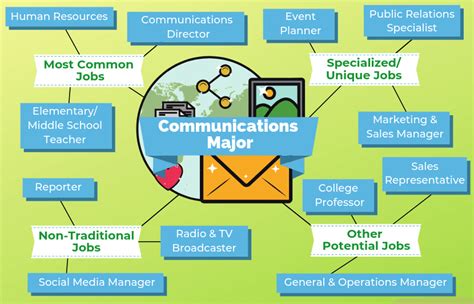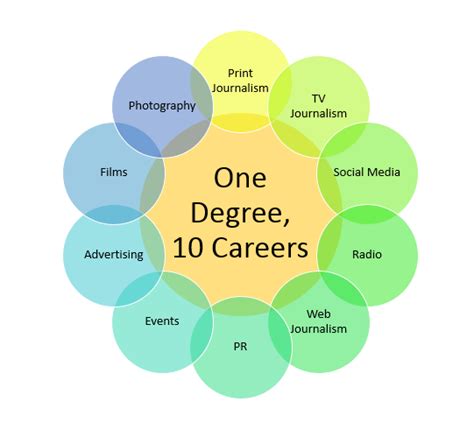Communication Major Careers

The field of communication is an exciting and diverse discipline that equips individuals with a unique skill set, opening doors to a multitude of career paths. A degree in communication offers a broad range of opportunities, from traditional roles in media and public relations to more specialized positions in marketing, digital content creation, and corporate communication. This article delves into the diverse career prospects available to communication majors, highlighting the skills, industries, and specific roles that leverage their education and expertise.
Understanding the Versatility of a Communication Major

Communication majors graduate with a robust toolkit of skills, including exceptional written and verbal communication abilities, critical thinking, and an understanding of various media platforms. This versatility makes them highly sought-after in a wide array of industries, from creative fields to business and corporate environments.
Creative Industries: A Hub for Communication Grads
One of the most natural career paths for communication majors is the creative sector. This includes roles in advertising, where graduates can work as copywriters, strategists, or art directors, crafting compelling campaigns and narratives to promote products or services. In the film and television industry, communication majors can find themselves as scriptwriters, production assistants, or publicists, leveraging their storytelling and media expertise.
The publishing industry is another fertile ground for communication graduates. They can work as editors, journalists, or content creators, producing written materials for books, magazines, or online platforms. Their skills in language, research, and storytelling make them invaluable in this field.
| Creative Role | Description |
|---|---|
| Copywriter | Crafts persuasive copy for advertising campaigns |
| Scriptwriter | Writes scripts for films, TV shows, or plays |
| Editor | Reviews and improves written content for clarity and accuracy |

Business and Corporate Environments: Strategic Communication
Beyond the creative realm, communication majors are also well-positioned for success in business and corporate settings. Their skills in strategic communication, public speaking, and interpersonal dynamics make them valuable assets in various departments within a company.
In marketing, communication graduates can take on roles as brand managers, social media strategists, or market researchers, using their understanding of audience behavior and communication trends to develop effective marketing plans. They can also work in public relations (PR), managing a company's reputation, drafting press releases, and organizing events to foster positive public perception.
The corporate communication sector is another prime area for communication majors. They can work as internal communicators, facilitating clear and effective communication within an organization, or as external communicators, handling investor relations or crisis communication.
| Corporate Role | Description |
|---|---|
| Brand Manager | Oversees the development and execution of brand strategies |
| PR Specialist | Manages an organization's public image and handles media relations |
| Internal Communicator | Facilitates effective communication within an organization |
Emerging Fields: Digital Communication and Beyond
With the rapid evolution of technology, communication majors are finding exciting opportunities in emerging fields. The digital communication landscape, for instance, offers roles in content creation, social media management, and digital marketing, where graduates can leverage their skills to engage audiences in innovative ways.
Additionally, communication majors are increasingly sought after in healthcare and non-profit organizations. In healthcare, they can work as patient advocates, community health educators, or in marketing and communication roles within healthcare institutions. In the non-profit sector, their skills in storytelling and communication can be used to raise awareness, secure funding, and drive social impact.
| Emerging Role | Description |
|---|---|
| Social Media Manager | Manages and creates content for social media platforms |
| Patient Advocate | Assists patients in navigating healthcare systems and supports their rights |
| Fundraising Manager | Develops strategies to secure funding for non-profit organizations |
Conclusion: A World of Opportunities

A degree in communication opens up a vast landscape of career possibilities. From traditional creative roles to innovative digital positions and strategic corporate communication, communication majors are equipped with a skill set that is increasingly valued in today’s dynamic job market. As industries continue to evolve, the demand for effective communicators will only grow, ensuring a bright future for graduates with a passion for conveying ideas and connecting with audiences.
What are some key skills that communication majors develop during their studies?
+Communication majors typically graduate with a strong foundation in written and verbal communication, critical thinking, and an understanding of various media platforms. They learn to craft compelling narratives, analyze audience behavior, and adapt their communication strategies for different contexts.
How can communication majors stay updated with industry trends?
+Staying current in the communication field involves continuous learning and networking. This can be achieved through professional development courses, attending industry conferences and events, joining relevant professional associations, and actively engaging with industry publications and online resources.
What are some common challenges faced by communication professionals, and how can they be overcome?
+Communication professionals often face challenges such as managing client expectations, staying creative under pressure, and keeping up with rapidly evolving technology. These can be addressed through effective time management, cultivating a strong network for collaboration and support, and investing in ongoing skill development to adapt to industry changes.



